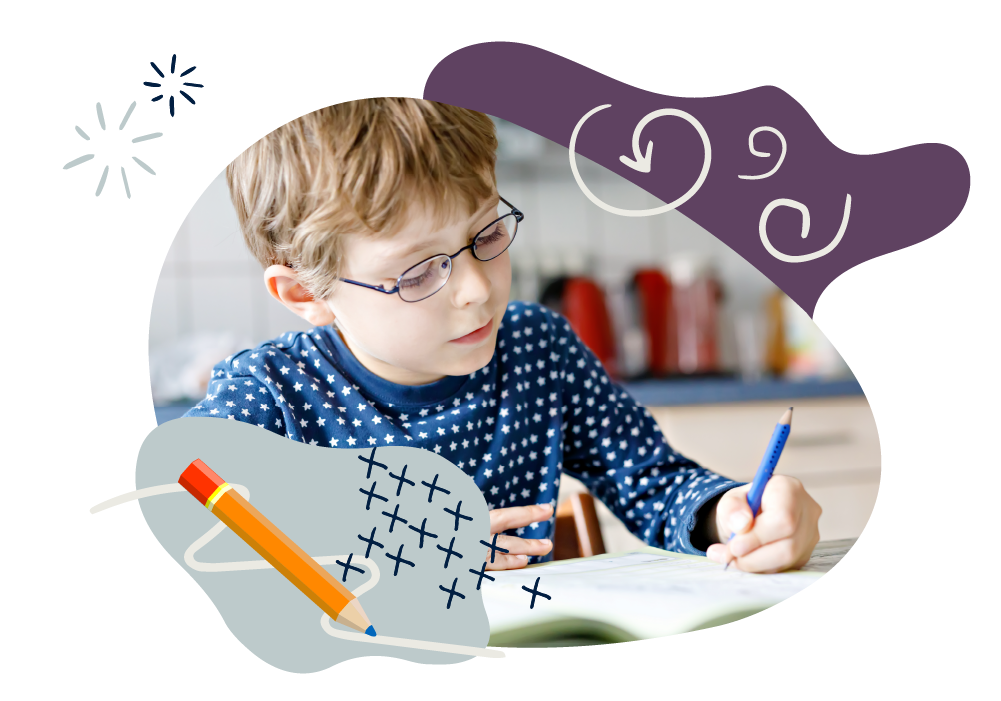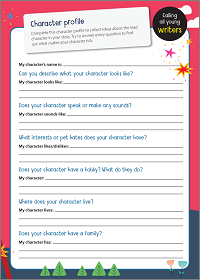Writing Composition
Learning to write is one of the most important and most difficult things that your child will do at primary school. When your child writes, they put together all the other skills they have learned in English: creating ideas, forming letters, remembering their spellings, choosing the right words and checking their grammar.
The National Curriculum divides writing into two broad areas: transcription and composition.
Transcription covers the technical aspects of writing: handwriting, spelling, grammar & punctuation, and so on.
Composition is about creating at text by sharing ideas, thinking of the audience and structure.
How to help at home
In order to persevere with writing, children need to care about what they are writing about. Fortunately, learning to write is also a lot of fun, and there are all sorts of enjoyable ways you can help your child learn to love writing.
1. Read to your child
Written language is often very different from spoken language. Read to your child as often as you can, including longer chapter books and non-fiction books about a subject they are interested in. This will help them to become more familiar with different styles of writing.
2. Have your child to read to you
Making time to hear your child read isn’t just good for their reading. Seeing words in print helps them to understand the words, to spell them, and to see how grammar and punctuation are used to make meaning.
When you read fiction, occasionally talk about the choices the author has made. For example:
‘I wonder why the author has chosen to describe the castle as “gloomy”? I wonder what that tells us about what might happen there?’
When you’re reading non-fiction, talk about the features that make it easy to read such as headings, a glossary or diagrams.
3. Try some real-world writing
Writing for a real purpose can be a great way to fit in some practice. Writing cards, shopping lists, or letters or messages to relatives can be motivating real-life reasons for writing, and can show children how useful it is to be able to write well. They will also learn that we use different writing styles in different situations.
Your child might enjoy keeping a diary or writing short stories based on books they have read or toys they enjoy playing with. Perhaps your child might like to create a poster or mini-book about a topic they love. They might like to create their own comic strip about a character the know well. Be sure to encourage your child to write about what most interests them, as this is the best way to keep them enthusiastic.
4. Tell stories aloud
Giving your child the opportunity to tell stories orally is a great way to get them used to structuring their ideas and using adventurous language. If they’re not sure where to start, see if they can retell a story that they already know well, like Little Red Riding Hood or Three Little Pigs. If your child prefers non-fiction, encourage them to tell you a subject they are interested in – get them to talk in full sentences with plenty of detail.
If your child finds it useful to plan out their story first, try our free Story mountain to make a great plot or use our Character profile activity sheet to come up with an interesting lead character.
Activity: Story Mountain
Complete the story mountain to plan your sotry with a beginning, middle, and end.
Activity: Character profile
Come up with lots of interesting details about the lead character in your story.
Video: How to develop storytelling skills
Suzy Ditchburn offers practical tips for improving storytelling confidence.
5. Find story inspiration
You can find fun story ideas anywhere! Why not raid your kitchen cupboards or hunt through the attic to find lost treasures? Anything from an old hat to a telescope will do the trick. What could the object be used for? Who might be looking for it? What secrets could it hold? Suggest different genres such as mystery or science fiction and discuss how the item might be used in this kind of story.
Real-world facts can also be a great source of inspiration. For example, did you know a jumping flea can accelerate faster than a space rocket taking off into orbit? What crazy story can your child make out of this fact? Newspapers and news websites can be great for finding these sorts of ideas.
If your child prefers non-fiction, use the facts you find to create a fact sheet, a poster or a mini-book.
6. Get drawing
If your child isn’t sure where to start, it can sometimes be helpful to sketch out their ideas first. For instance, can they draw a picture of a dastardly villain or a brave hero? How about a scary woodland or an enchanted castle? Can they draw the shark or spider they want to write an information book about?
Your child might also find it useful to draw maps or diagrams. What are all the different areas of their fantasy landscape called? How is the baddie’s base organised? Or for non-fiction, where does their shark or spider live?
Some children might enjoy taking this idea a step further and drawing their own comics. This is great practice – it stretches your child’s creativity, gets them thinking about plot, character, and dialogue, and is a big confidence boost once they’ve finished and have an amazing story to look back on.
For more ideas on writing stories, look at our Creative Writing page or check out our Creative writing books.
What your child will learn at school
Click on the links below to find out about the writing skills children practise year by year.
Writing Composition in Year 1 (age 5–6)
In Year 1, your child will learn:
-
- to write simple sentences
- to say a sentence out loud before writing it down
- to put sentences into the right order to tell a short story
- to re-read what they have written to check that it makes sense
- to talk about their writing with their teacher or classmates
- to read their writing out loud to their teacher or the class.
Writing Composition in Year 2 (age 6–7)
In Year 2, your child will learn:
-
- to write about things that have happened to them
- to make up simple stories
- to write about real events
- to write simple poems
- to write non-fiction for different purposes
- to plan their writing by either talking about what they want to write or by writing down key words
- to read their own writing and make changes to it
- to read their writing out loud.
Writing Composition in Year 3 (age 7–8)
In Year 3, your child will learn:
-
- to talk about similar pieces of writing, and using these to help them plan their own
- to plan their writing by talking about it or writing down key words
- to use a rich vocabulary and a range of sentence structures to make their writing interesting
- to create settings, characters, and plots for stories
- to use simple organisational devices (for example, headings and sub-headings) when writing non-fiction
- to proof-reading their writing for spelling, grammar, and punctuation errors
- to read their writing out loud.
Writing Composition in Year 4 (age 8–9)
In Year 4, your child will continue to practise the skills they learnt in Year 3. They will:
-
- talk about similar pieces of writing, and using these to help them plan their own
- plan their writing by talking about it or writing down key words
- use a rich vocabulary and a range of sentence structures to make their writing interesting
- create settings, characters, and plots for stories
- use simple organisational devices (for example, headings and sub-headings) when writing non-fiction
- proof-reading their writing for spelling, grammar, and punctuation errors
- read their writing out loud.
Writing Composition in Year 5 (age 9–10)
In Year 5, your child will learn to:
-
- decide who they are writing for and what this means for their writing
- plan their writing before they start
- choose the right style and structure to match the type of text they are writing
- choose the right vocabulary and grammar for their writing
- write a story with interesting vocabulary and dialogue
- write non-fiction with features such as headings, captions, bullet points, subheadings and diagrams
- use a consistent tense throughout their piece
- check their own writing and the writing of their classmates, making useful comments.
Writing Composition in Year 6 (age 10–11)
In Year 6, your child will learn to:
-
- decide who they are writing for and what this means for their writing
- plan their writing before they start
- choose the right style and structure to match the type of text they are writing
- choose the right vocabulary and grammar for their writing
- write a story with interesting vocabulary and dialogue
- write non-fiction with features such as headings, captions, bullet points, subheadings, diagrams
- use a consistent tense throughout their piece
- check their own writing and the writing of their classmates, making useful comments.


